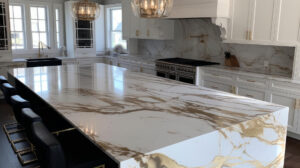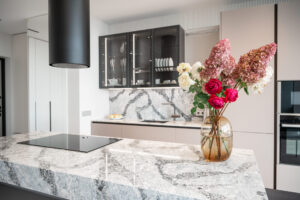
If you’re considering a kitchen or bathroom remodel, one of the primary decisions you’ll need to make is the material for your countertops. While granite has been a long-standing popular choice, there’s a growing preference for quartz countertops among homeowners and interior designers. This shift has been spurred on by several unique advantages that quartz brings to the table. But what exactly are these advantages? In this article, we explore in-depth the seven key reasons why quartz is often preferred over granite counters now.
Quartz is rising in popularity over granite due to several reasons, including its impressive durability, non-porous nature, variety in design options, minimal maintenance requirements, resistance to stains and scratches, consistency in color and pattern, and excellent value for money.
Interested in finding out why quartz is the new favorite? Keep reading as we dive deep into each reason, helping you make an informed decision for your space.

Another significant advantage of quartz surfaces is their non-porous nature. Unlike granite, quartz doesn’t have tiny pores or fissures where liquids or bacteria could infiltrate. This quality makes quartz a more hygienic option, particularly beneficial for kitchens or bathrooms where cleanliness is paramount.
Furthermore, quartz non-porous quality also lends itself to stain resistance. This means that accidental spills, common in the hustle and bustle of kitchens and bathrooms, won’t seep into your quartz countertop, causing unsightly discolorations or damage.




Quartz’s engineering process allows for a plethora of designs and aesthetic possibilities. While granite patterns are limited by the stone’s natural formation, quartz can be designed to resemble other stone types or imbued with an array of colors and patterns to suit various design aesthetics.
Whether you’re striving for a modern minimalistic look or a traditional, rustic vibe, quartz’s versatility in design allows for a perfect match with your desired theme.
For homeowners seeking to minimize their home maintenance tasks, quartz offers a compelling advantage. Unlike granite, which needs periodic sealing to maintain its luster and protect against stains, quartz requires no such treatments. Its non-porous nature ensures it remains resistant to stains and retains its shine with just routine cleaning.
If you’re keen on achieving a consistent look in your design, quartz won’t disappoint. Each slab of engineered quartz maintains uniformity in color and pattern, which granite, with its natural variations, can’t ensure. This uniformity is particularly beneficial when using multiple quartz slabs, or large surface areas, ensuring a seamless look.

Quartz’s durability, low maintenance needs, and timeless aesthetic appeal combine to provide excellent value for your investment. While the upfront cost of quartz can be slightly higher than granite, its long-term benefits, including less upkeep and potential for lasting beauty, often balance out the initial expenditure.

In high-traffic areas like kitchens and bathrooms, a countertop’s resistance to scratches can be a crucial factor. Quartz shines in this department, with high resistance to scratches, ensuring that your countertop retains its beauty through years of use.
Which countertop adds the most value?
In terms of adding value to your home, both quartz and granite countertops are attractive options. However, given the trend towards quartz’s increased popularity and its longer lifespan due to low maintenance and high durability, quartz countertops are a sound investment for long-term home value.
Does quartz yellow over time?
Unlike some other countertop materials, quartz does not tend to yellow or fade over time. The pigments used in the manufacturing process are stable and resist UV radiation, ensuring the color stays true over time. However, it’s crucial to protect your quartz counters and surfaces from extreme heat or direct sunlight to maintain their pristine condition.
Is it worth replacing granite stones with quartz?
The answer to this largely depends on your personal preference and lifestyle. If you prefer a countertop material that requires less maintenance, provides more uniformity in design, and offers superior durability and stain resistance, then replacing your granite slab with quartz could be a worthwhile investment.
Does quartz need to be sealed?
One of the significant advantages of quartz is that it does not require sealing. Unlike granite, which needs periodic sealing to prevent stains and maintain its luster, quartz’s non-porous nature ensures it its solid surface remains resistant to stains without the need for sealing.
In sum, quartz countertops offer an impressive blend of durability, beauty, and convenience, making them an increasingly popular choice over granite. While both materials have their unique benefits, the trend towards quartz shows no sign of slowing down.
As with any home improvement decision, it’s important to consider your specific needs, design preferences, and budget when choosing between quartz and granite countertops. Armed with these insights and answers to common questions, we hope you can make a well-informed decision that best suits your home and lifestyle. Always consult with your countertop contractor or designer to discuss your options and ensure the best outcome for your space.